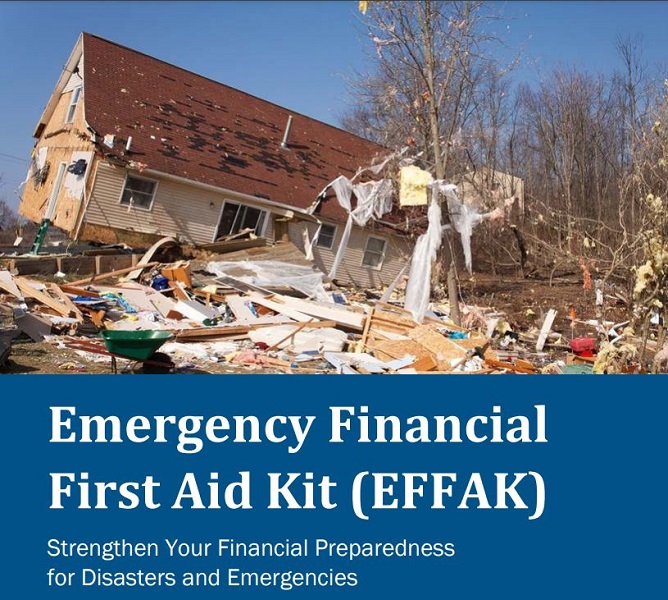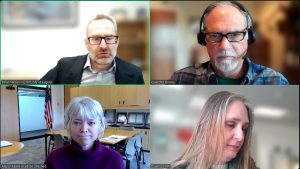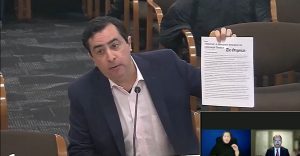FEMA: Ask trusted financial advisors for help preventing identify theft
8 min read
Recognizing April as National Financial Capability month, FEMA asked Pacific Northwest financial institutions to talk about identity theft.
[00:00:10] Jennifer Reed: Fourteen million people were victims of identity theft in 2018. That number to me is just staggering. And I saw a new statistic earlier today that, it talks about in this country alone, 14 people a minute have their identities stolen. That is just astonishing and we needed to know what we can do to protect ourselves and our family members, whether it’s our children or maybe it’s our parents who are elderly, looking out for signs and how they can protect themselves.
[00:00:42] A lot of times we just type in the main website. That says just HTTP. That means that the website’s not secure, and a lot of people don’t know that. So what you want to look for is this HTTPS. That means that it is a secure website. It may even have a lock on it, so that you know that that website is safe and secure. I know I talk to my mom, my son about things like this. These are things to watch out for, because it’s really easy for us to think. ‘Oh, I can just put my information in here.’
[00:01:16] Another thing that I talk to people about as we’re talking about websites: When you are purchasing something online, don’t use your debit card, because that is where your cash is, right? The debit card. If somebody gets ahold of your personal information here and they take it out of your checking account, you’re going to be without that money until that situation is resolved. So if you have $5,000 in there and you’re not monitoring your checking account, they may be clearing out all of that money in your checking account, and you don’t have access to it until the financial institution has gone through the situation, reviewed it and determined that, ‘Yes, you had identity theft,’ and then they credit the money back. That could take seven to 10 days. And we all know that you have out there bills that you have to pay in the meantime. So my suggestion to people is that if you have a credit card, that is what you should be using, when you’re purchasing things online.
[00:02:13] Everyone should be monitoring their credit report at least twice a year. And you can go to AnnualCreditReport.com and you can access your credit report for free. What used to be once a year through all three bureaus is now, you can do it since COVID took place, they’ve made it so that people can check their credit reports every single week at no charge. It’s free. And that is such a great thing for people to have access to. What it is going to tell you is, What loans are opened in your name? Who has looked to do an inquiry on you recently, for your credit, those types of things? And then you can see if anybody’s opening any accounts that weren’t you.
[00:03:00] And I get an email and it’ll tell me if anything in mine or my husband’s or my son’s name or credit report has changed. That gives me a little bit of peace of mind because I know nobody’s opened anything in our names without our permission.
[00:03:17] FEMA: So we did receive a few questions. One is, an application received in the mail that has their name on it. Should that application also be shredded?
[00:03:27] Jennifer Reed: If you’re not going to fill it out and send it back, absolutely. Anything that they sent: Shred it, burn it, whatever you have to do so that somebody cannot go out and open it in your names, because if they get their hands on that and they, they, again, dumpster diving, right? So if they go in and they go through your dumpster and they’re able to find out other information and they can fill it out on your behalf, you want to avoid it. So I would highly recommend shredding them.
[00:03:52] FEMA: Okay. And then the next question is: What is the recommended amount of cash to have on hand in case of an emergency? In case the ATM’s are shut, the power’s out, et cetera.
[00:04:05] Jennifer Reed: Yeah. That is something that it’s going to be depend on an individual basis. Right. Everybody has their own comfort levels. But what I would say is that if you do keep cash on hand, make sure you put it in a space that can avoid fire, that no one else, other than you and those in your circle that you trust has access to. And even that you need to think twice about, because like we said, you hear about people who are taken advantage of by friends and family that they think they can trust. Just keep that in mind. and know that it’s in a safe spot where only you can access those funds.
[00:04:45] FEMA: And we always recommend that, especially from the preparedness perspective, because if there is a power outage or if you’re not able to access CTMs and banks, smaller bills are always good to have. Like if you need some water from the store, they might still be able to sell you that water, even if they can’t accept credit cards. And if you only have a $20, you know, for a few bottles of water, you may not be getting change back. So it’s good to have smaller bills as part of your cash and your savings for your rainy day fund.
[00:05:15] Someone asked, Does it do any good to report phishing or robocallers?
[00:05:21] Jennifer Reed: Absolutely. So that is how I think I would suggest going to your attorney generals again, or reaching out if that’s coming through a financial institution, letting them know we are always trying to see 10 steps ahead of the fraudsters, right?
[00:05:35] But they’re always coming up with ways to take advantage of people. And if people aren’t alerting authorities or the institutions that they work with about what’s taking place, we don’t have a way of knowing. So we’re always trying to keep our eyes and ears open. But if no one’s telling us, then we don’t know how we can stop it in advance. So yes, please do share that information with those who can assist.
[00:05:59] FEMA: Then how do you handle identity theft with hospital visits by someone else?
[00:06:04] Jennifer Reed: I’m assuming they mean that someone who’s gone to a hospital and used your identity to use your insurance. That’s my guess. Again contact the insurance company right away and you’re going to have to go through those same steps then filing a report. And going through the process of having your identity stolen that way.
[00:06:22] Maybe it’s a mistake by the insurance company. Maybe they connected it to the wrong account, but if they did take advantage of you, you’re going to want to work through that process with the insurance company and the bureaus that are out there too. Because if they got ahold of your insurance, there’s a chance they might have gotten a hold of something else to open an account in your name, unfortunately.
[00:06:44] FEMA: A friend has his computer screen locked up with a message that said Microsoft would have to do something to fix it. He didn’t realize it was a scam and paid the money. Should he be concerned now that his identity might have been stolen? What should he do?
[00:06:59] Jennifer Reed: I would say anytime something like that happens, it’s a great opportunity to make sure you start monitoring your credit to make sure no one else has taken advantage.
[00:07:09] But it is a very big possibility. Now, if you are worried that someone has access to your identity, you can contact all three bureaus and put a freeze on. Your authorization on opening accounts, you can put a freeze on that with the bureaus so that nobody can open an account unless you were to call the bureau and say, ‘Hey, I’m trying to open this specific account at ABC financial institution. I want to do this. This is my contact information.’ You’re able to do that. So something to think about in a situation like that, where somebody’s taking advantage of someone.
[00:07:45] FEMA: Let’s see. If someone used a stolen or old insurance card and was pulled over, could a person be charged for that type of theft?
[00:07:54] Jennifer Reed: Yeah, I’ve read about that recently, they do use that, for issues that have come up with the police. So those are things you want to be careful of. And again, there’s new inventions, unfortunately, that they’ve come up with every day and the rest of us just have to be prepared to protect ourselves as much as we can.
[00:08:14] Have these conversations with your friends and family, you know, have this, what are people doing? Make sure you’re sharing the experiences. And again, things are changing every day, right? So what we did yesterday to help protect ourselves may change tomorrow. So just make sure you’re having those conversations to see what people are doing to protect themselves.
[00:08:33] FEMA: Yeah, it’s really important to talk about, to be proactive and make sure all the systems are up to date. Our passwords are strong. I know there was a lot of great commentary about using password managers, which generate pretty complex passwords that are hard to guess.
[00:08:50] And what about any other free resources that people can further their financial preparedness practice?
[00:08:57] Jennifer Reed: Making sure you’re finding a financial institution who you can partner with and trust, and that is willing to help people and provide the information you need to be educated. I would look at that and follow, the Attorney General’s website for other topics. They’re doing a lot of education out there too, and offering webinars to help people. So make sure you’re looking at the latest information that they have out there. And just, I can’t say it enough. Educate, educate, educate as much as possible.
[00:09:29] John Q: Jennifer Reed at a FEMA presentation during National Financial Capability month. Reach out to your own trusted financial advisers to protect yourself and your loved ones.






